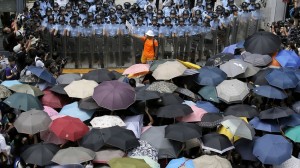(originally posted to different page, just adding this to homepage)
Pro-democracy protests have been ongoing for over a week now in Hong Kong, as tens of thousands of protesters demand a truly democratic electoral system, as opposed to the recently announced system of “universal suffrage” whereby a Chinese electoral committee selects 3 candidates who the people of Hong Kong can then vote on for the role of Chief Executive, the highest political role in the territory. This came as a major disappointment for Hong Kong citizens, who were hoping for full freedom to select their own candidates in the upcoming 2017 election and move towards a more independent Hong Kong. As a result, protesters have been staging an occupy styled sit-in of the downtown commercial district in central Hong Kong. The ANZ Bank in Hong Kong has estimated that the protests have already cost Hong Kong retailers over 2 billion Hong Kong dollars (roughly 290 million CAD), along with the losses in productivity as businesses have closed and thousands of workers have taken to the streets in protest. Seeing as the Hong Kong Chief executor has declared the protests “illegal” and the Beijing government has little to no chance of making concessions to the protesters in fear of inspiring similar protests in the mainland, there is significant opposition to the protests in Hong Kong by those convinced of its futility. As this protest shows no signs of slowing down without police/military intervention, the losses in productivity will continue to climb until some resolution to the protests comes into place. The world can only hope that it will not bear any resemblance to the resolution of the 1989 Tiananmen Square protests.

http://www.bbc.com/news/business-29470815
http://time.com/3471366/hong-kong-umbrella-revolution-occupy-central-democracy-explainer-6-questions/
Image source:
http://mashable.com/2014/09/29/hong-kong-democracy-protests/
